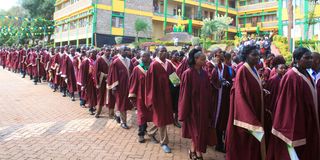
Registrar in charge of examinations at Nyeri National Polytechnic, Elias Gitau, explains how the institution has developed a system to assist in generating assessment tools on March 31, 2025.
For as long as exams have existed, teachers have relied on their expertise to set, administer and mark valid, reliable and balanced assessments.
What if that power shifted? What if examinations are not written by a human, but by artificial intelligence (AI) – one that understands your learning style, masters the curriculum, and adapts in real time?
This is what is already happening at Nyeri National Polytechnic.
For decades, technical and vocational institutions across the country have depended on the Kenya National Examinations Council (Knec) to prepare and mark exams – a costly arrangement that strains budgets.
“Before we embraced Artificial Intelligence, we were spending Sh21 million every year paying Knec to set and mark exams in March, July and November,” said David Mwangi, the chief principal, “It became unsustainable, especially as government funding slowed.”
The Sh21 million expenditure on examinations has now been reduced to Sh2 million. Faced with rising costs and bureaucratic delays, the institution turned to technology and developed AGEX, an AI-powered exam generation system, in collaboration with a local developer.
Today, AGEX handles all examination needs for the institution’s 1,400 course units across 11 academic departments.

Graduands in a procession during a past graduation ceremony at Nyeri National Polytechnic on September.
“We control the system by setting clear boundaries,” Mr Mwangi explains, “It doesn’t pull information from anywhere. We have given it a defined knowledge base: reference materials, textbooks, and policy-aligned documents. Most importantly, it’s anchored on our Occupational Standards, which form the benchmark of our technical training.”
He adds that AGEX is also trained on detailed course curricula and institutional cost plans, ensuring that every assessment is aligned with what students are taught and industry needs.
“It is a self-learning tool, like ChatGPT, but tailored to our context,” he says. “When prompted to generate an exam, it produces more than just questions. It gives a full assessment tool and marking guide. For practical courses, it even generates cutting lists, which are inventories of tools and materials required.”
These inputs ensure AGEX never generates random or irrelevant questions. Instead, it adheres to three core pillars: the curriculum, the occupational standards, and cost structures.
Each course is broken down into term-by-term units. For instance, in Term I, AGEX identifies the three units to be covered, specifies topics for continuous assessment tests (CATs), and aligns them with the learning outcomes.
And its capabilities extend beyond exam generation.
Maintain academic integrity
“AGEX also supports trainers by syncing teaching plans with the syllabus,” Mr Mwangi says. “Instructors know exactly what to teach each term—and what to assess.”
“All our exams for the year are already generated. The system allocates marks for each question and ensures assessments match the content covered in class,” he adds.
The AI tool is connected to a printer. Once the AI assessment tool generates the examinations, they are printed and distributed to students.
According to the institution’s examinations registrar Elias Gitau, AGEX was rolled out in November 2023 and has been undergoing refinements since.

Registrar in charge of examinations at Nyeri National Polytechnic, Elias Gitau during an interview on March 31, 2025.
“We have been training the system for about seven months. In the beginning, we had to feed it very specific materials but the more we use it, the smarter it becomes,” Mr Gitau said.
Before AGEX, exam season meant long hours for lecturers rushing to meet deadlines.
“Now, a simple prompt generates an entire exam: questions, mark allocations, and guides within minutes,” says Mr Gitau, “It’s a major shift in efficiency.”
To maintain academic integrity and data security, only three examination officers are authorised to access AGEX.
“It’s an offline system. It doesn’t fetch data from the internet. That’s how we maintain quality and control,” Mr Gitau says.
One of AGEX’s standout features is its ability to tailor exams based on Bloom’s Taxonomy, the global educational standard for cognitive learning.
“For low-level courses, it uses simpler commands like ‘list’ or ‘define’. For high- level assessments, it automatically raises the complexity using verbs like ‘analyse’, ‘explain’, or ‘evaluate’,” he explains.
Once AGEX generates a draft, the assessment is reviewed and moderated by trainers.
If it does not meet expectations, a fresh version can be produced instantly.
Looking ahead, the institution wants AGEX to evolve further to generate daily lesson plans and timetables.






